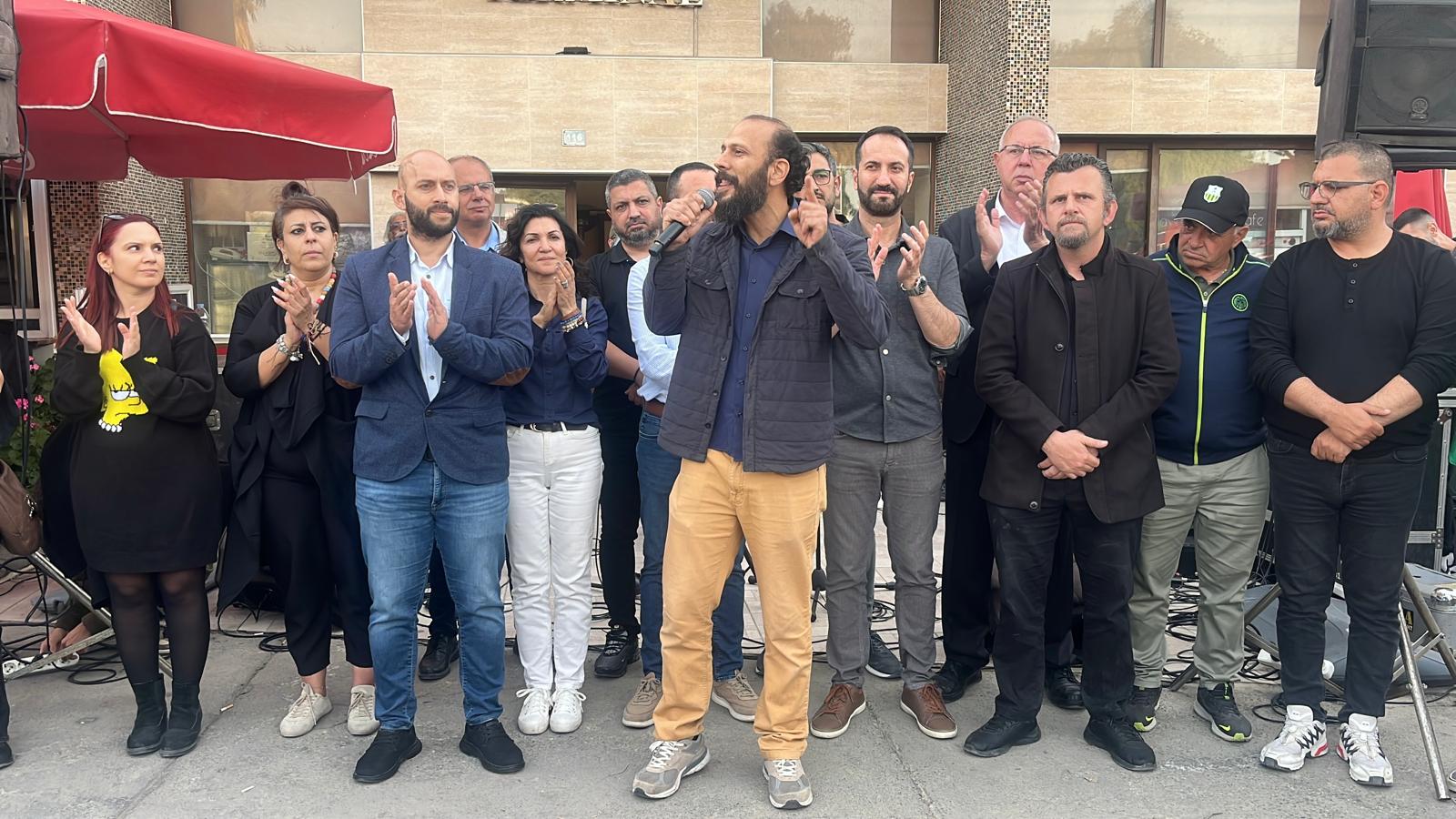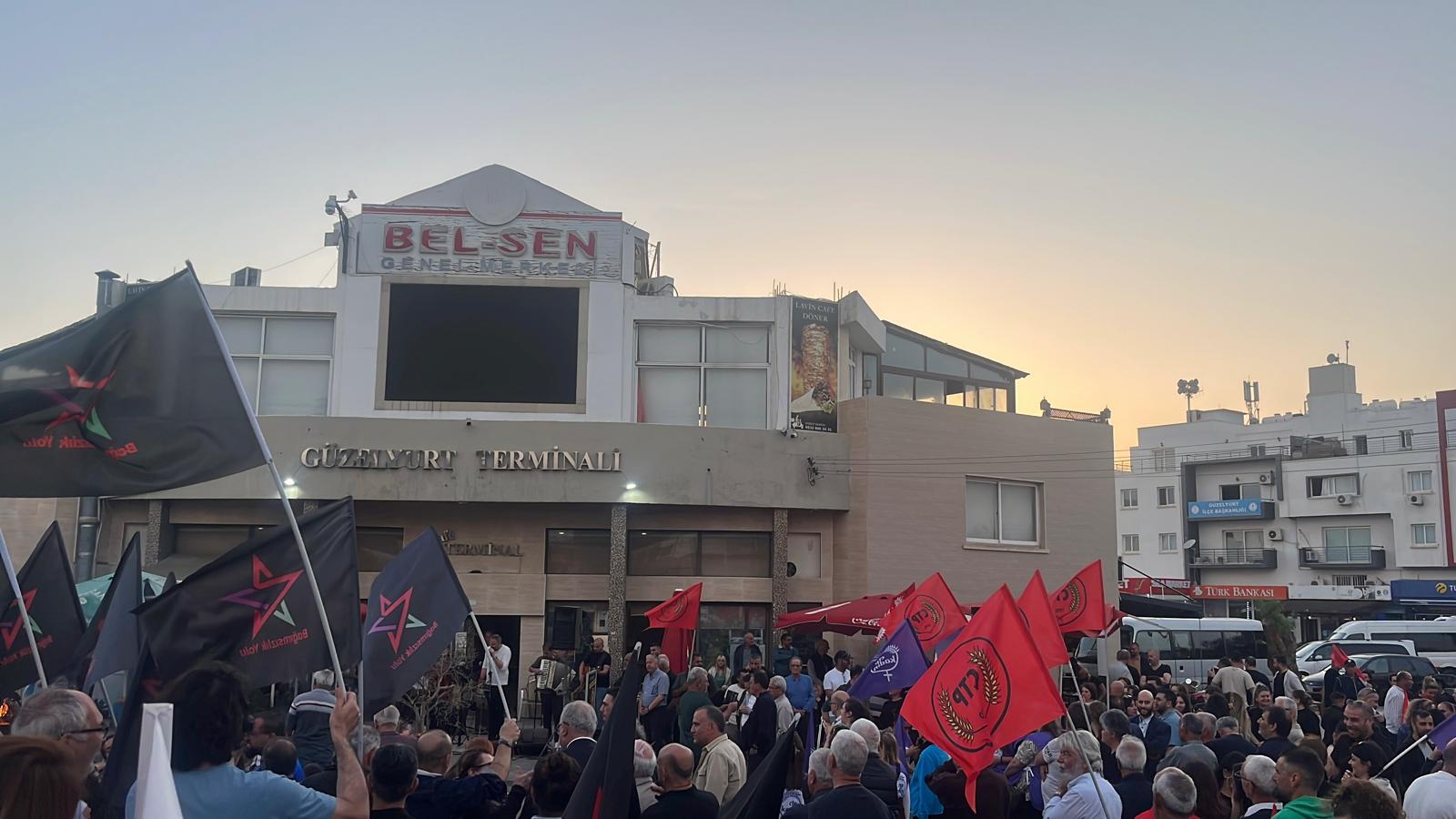There were fires lit and dancing on the street as Morphou became the fourth town to hold a protest against the north’s ruling coalition’s decision to legalise the wearing of hijabs by children at public schools on the ninth consecutive weekday of such protests.
The protest was held in front of the town’s bus station, with communist political party Bagimsizlik Yolu’s secretary-general Umut Ersoy addressing the crowd.
“The first people we must thank here today are our teachers, because if teachers had not stood up against the political Islamists and set up the first barricades, we would not have been able to bring the fight to the level it has been brought today. Thank goodness you exist, teachers,” he began.
“For a month and a half, Cyprus, at least the north of it, has been echoing with these slogans. We have been saying ‘no way’ for a month and a half. We have been saying the same thing since day one because we know what we are up against. Unfortunately … the political Islamists are hiding behind children and trying to impose their own political agenda on us. They are trying to do all kinds of child abuse.”

He went on to say that while thus far, there has only one recorded case of a child being sent to school in the north wearing a hijab since the law was changed, he sees the protest as no less important, given what may happen if the law is simply allowed to remain as it is.
“Today, there has been one girl, tomorrow, there will be two girls. They will try to force hundreds, thousands of girls to cover their heads. We have been saying ‘no way’ since day one because we stand against child abuse,” he said.
He then turned to the matter of Turkish Cypriot society itself and offered a congratulation to it for its apparent unity in its rejection of the law.
“I am not saying that the Turkish Cypriots are wonderful, but we have our own unique understanding of secularism, and I can say that it is really hard to find such a level of understanding of each other in this difficult region, the Middle East.
“We know very well that political Islam will start with education, then continue with changes to the curriculum, continue with interventions in our lifestyle, and then intervene in our right to vote,” he said.
He then made reference to two events which he said prove that the hijab law is being imposed on the Turkish Cypriots by Turkey.
The first is the alleged involvement of the AK Party’s “TRNC representative” Emre Kaya in an incident where a teenage girl was driven to the Irsen Kucuk middle school in northern Nicosia last month and told, allegedly by Kaya, to enter the school wearing a hijab.
The second is a behind-closed-doors meeting between Turkish Cypriot leader Ersin Tatar and Ali Murat Basceri at the start of April, which Tatar was forced to deny was held to discuss the matter of the hijab law.
“We saw the AKP Cyprus representative, we saw the ambassador, so let’s say it, we know where this imposition comes from. The imposition comes from the AKP,” he said, “AKP” being the name colloquially given to the party by its deriders.
He added that since the law was first introduced last month, “they have tried to do everything to divide us, to fragment us, to provoke us, to change the essence of the issue”.
“They said this issue is an issue between Cypriots and people from Turkey, but it is not. We are not opposing the impositions of political Islam based on origin. As people with different political views, people with different beliefs, as the Turkish Cypriot people, we say with all our colours, ‘no way’ to this imposition from the AKP!”
Once Ersoy’s speech had drawn to a close, a live band began to play music, and protesters, including Ersoy and Turkish Cypriot Parliamentary Assembly of the Council of Europe (PACE) observer Armagan Candan, who himself is a Morphou native, began to dance on the streets.
Candan also spoke to the Cyprus Mail at the protest, and was already looking ahead to Friday’s protest, which will be held outside the north’s ‘parliament’ building in northern Nicosia.
“I think it is very important to raise our voices here today, and then, tomorrow, with the protest which is to be held in Nicosia, this stage will reach a new stage,” he said.
He added that after Friday, the various political parties, trade unions, and civil society organisations supporting the protest will “sit together and decide how the fight will continue”.
“This was planned as a two-week fire-lighting process, and tomorrow this fire-lighting process will end, but of course, the fight continues with different ways and means. It will continue until the law is withdrawn. The fight will continue,” he said.
Asked what he foresees for after the April 28 deadline which trade unions had set the government to withdraw the law, he said, “the organisations will come together, and first, a general strike, and then everything necessary will be done for this law to be withdrawn”.
“We will see a general strike, and we will see the fight continue together.”






Click here to change your cookie preferences